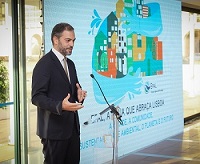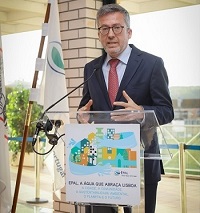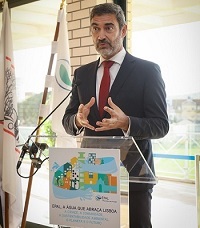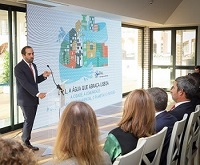Among the projects are the premises for Academia das Águas Livres’ new facilities and related facilities for the enjoyment of the community.
The public session “EPAL, the Water that embraces Lisbon – the city, the community, environmental sustainability, the planet and the future” took place today, with the presentation of ten projects that promise to revolutionise life in Lisbon.

The session was attended by the Minister for the Environment and Climate Action, Duarte Cordeiro, who, in his speech, began by recalling that the “city had been waiting a long time for this problem to be solved”, referring to Campo de Ourique Reservoir, later stating: “We want spaces with these characteristics, open to the city, but, more than that, open to training, knowledge and the world”.

The Mayor of Lisbon, Carlos Moedas, shared that his “dream” is for this reservoir to be “an island of freshness, with no barriers, so that people who pass by here enter and experience the space. We are united in sustainability, united in education and training and united in defending Lisbon. I am truly happy to see all this here.”

The President of the Board of EPAL, José Manuel Sardinha, highlighted the nine years of activity of EPAL’s Academia das Águas Livres, which has trained more than 9,500 trainees, in 700 courses, given by more than 200 trainers and speakers.

The President of Campo de Ourique Parish Council, Pedro Costa, also stated that this project “shortens distances and gives the city back to its residents”. He emphasised “we must seize the opportunity and extend this example to other public institutions.
The projects presented were:
Drinking Fountains in the City project. Your water anywhere in the city
After the opening of the first one, the city is getting ready to receive new drinking fountains, more modern and inclusive, which will allow you to drink tap water wherever you are. 50 are already installed, and in the first half of 2023, a total of 200 drinking fountains will be ready.
The New Drinking Fountains Project contributes to a city that wants to be increasingly cleaner and more sustainable.
Aqueduct and Underground Galleries Project. the ways of the water
By the beginning of next year, you will be able to visit the entire route of the Águas Livres Aqueduct.
After the famous crossing of the Alcântara Valley, it will be possible to walk the entire section of the whole Aqueduct, up to the emblematic Mãe d’Água das Amoreiras.
Following the success of Loreto, the ultimate goal is to make the remaining underground galleries accessible, with Rato being the first.
Chafariz Rehabilitation Project. Heritage with water
The importance that a chafariz had in the population’s life and in the city’s organisation is undeniable (a chafariz is a historical public drinking water tap, usually surrounded by an ornamental sculptured stone). They appeared precisely to satisfy the need for access to water. And although they no longer fulfil the function for which they were created, they continue to be an important aspect of the city's image and, naturally, they continue to tell a part of the most important story of Lisbon.
That is why it is of the utmost importance to restore the grandeur they once had by rehabilitating them.
The first ones are already like new (Rato Chafariz, Benfica or Garridas Chafariz, Intendente or Desterro Chafariz) and many others will follow.
Principe Real Lake rehabilitation project. Water makes the Pond
Príncipe Real Gardens were conceived and organised around a large octagonal pond with a fountain.
It is important to refill the pond with water as that is why it exists. Without water there is no pond.
Thus, EPAL once again fills one of the most important gardens in Lisbon with water and life, in a project that includes the rehabilitation of the pond.
As a water saving measure, it will work as a closed water circuit.
Penha de França Reservoir Rehabilitation Project. A 360º view over Lisbon
Penha de França Reservoir will be restored. Penha de França Reservoir, built between 1929 and 1932 and out of use for several decades, will gain a new life, newly restored and ready to receive visitors from the community.
This will be, without a doubt, one of the places that we believe will be included in the various tourist circuits, given its characteristics and its new features, a space where art, conviviality and freedom come together.
Águas Livres Aqueduct Project. Return to origins
Out of use since 1973, water stopped running through the Águas Livres Aqueduct and in the 1980s it began to receive people. It was open to the public for visits and is now an integral part of EPAL's historical/cultural heritage.
But water will run through it again. Just like yesteryear, water will pass through the Aqueduct towards a more sustainable city, a greener planet, a more promising future.
A project will be born where the environment, the economy, the community, heritage and culture come together with the same purpose.
Photovoltaic Project. 0% Energy
We started with Castelo do Bode and Vale da Pedra following the path of supplying water with a lower carbon footprint with the installation of photovoltaic panels.
EPAL 0% Energy has not stopped growing, with the objective of making EPAL a company that is 100% self-sufficient in energy, not only through this important measure but through many others that inspired Águas de Portugal Group and all its companies to follow the same course.
Already in the adjudication phase are the first solar panels in EPAL premises, in Lisbon. Parque das Nacões will be the first, with the installation of 650 kW in panels on the roof of the car park sheds.
Later, another 500kW will be installed.
One of the Telheiras Reservoirs will be the next step. An initial installation of around 500 kW, paving the way for a second phase of over 500 kW.
The European Union increasingly assumes the reduction in energy consumption and the elimination of energy waste as a key issue for its energy policy and EPAL positions itself as one of its advocates.
Amoreiras new building project. Requalification and Valorisation
Campo de Ourique is one of the most fashionable neighbourhoods in Lisbon.
And it is precisely here that the Amoreiras Building Project will be born.
An architectural solution developed within the scope of a public tender launched by EPAL in collaboration with the Order of Architects, for a new building on Rua José Gomes Ferreira, currently in the licensing phase.
With its housing/office aspects, the new Amoreiras building and its features will be an invitation to that area of the city and will contribute significantly to its requalification and enhancement.
Student Residences Project
Given the need for intervention in the Páteo do Tronco building, which has a significant number of issues that prevent its use, a logic was followed of not increasing the volume or construction area, but instead considering the complete redesign of its interior.
The proposal aims to create two types of accommodation unit (20 units), located on the upper floors, and occupation of the ground floor with the common areas of this type of infrastructure (reception, lounge, kitchen, laundry, etc.) and a connection to Páteo do Tronco.
The aim is for these residences to be used by students from other parts of the country, namely children of EPAL/AdVT workers.
We end with what is considered the most ambitious project of recent times.
New Academy Project. Water culture
Academia das Águas Livres was created by EPAL and opened on 4th October 2013.
Operating until today in Recinto do Arco, EPAL’s school has grown a lot in recent years and, therefore, needs more space and a new home.
We present EPAL’s New Academia das Águas Livres.
A new hub for the city of Lisbon, the Academy's new premises will be inclusive and open to the community.
In addition to training areas, venues for events and a splendid auditorium overlooking Monsanto, it will also have a restaurant and cafeteria with a terrace.
A plateau for the temporary exhibition of works of urban art with visibility from both inside and outside the enclosure; covered parking; space for practising outdoor sports, with changing rooms in the main building, and also an area for small fairs/temporary exhibitions, highlighting environmental and sustainability themes.
These are some of the offers that Nova Academia will have for the enjoyment of all those who want to have a good time here.